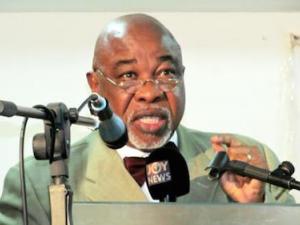Ghana and Nigeria’s persistent trade war must be resolved through the adoption of strategic and innovative ways to deepen social and economic diplomacy within the sub-region, Ambassador William Azumah Awinador-Kanyirige, Ghana’s High Commissioner to Nigeria, has said.
Trade relations between the two leading nations in the West African sub-region -- with a combined population of 200 million -- has been chequered, with both sides accusing each other every so often of protectionist tactics.
“We don’t have any major problem, we just have to be strategic and innovative in solving this challenge. There are certain challenges which have emerged daily during business interactions, let’s see how best to resolve them,” Ambassador Awinador-Kanyirige told the B&FT on the sidelines of the ‘Doing Business in Ghana II’ forum organised by the Ghana-Nigeria Business Council (GNBC).
The forum, among other objectives, was aimed at fostering unity and cordial relations between the two countries. It was also meant to further improve trade ties which underpin both countries’ mutual effort to grow their economies.
The Council was formed to provide a platform for stimulating economic development, social and business interaction among members. It is also to promote trade relations for the purpose of national development between both countries through a regular exchange of information among members.
The forum brought together participants from the Ghana Investment Promotion Centre (GIPC), Ghana Revenue Authority, Ghana Immigration Service, and business chieftains from both countries.
Ambassador Awinador-Kanyirige encouraged the two countries to educate their nationals on the various ECOWAS trade protocols, to enable them operate within the laws of member-states and help drive trade. He observed that there is a large pool of Ghanaian and Nigerian professionals in the diaspora with wonderful talent and ideas, and the two countries need to develop measures that tap into it.
“We should tap into the energy and talent of the professionals in the diaspora by using our diplomatic missions abroad. There are a lot of young graduate professionals in Europe, Canada, the US and other places. Many of them have been energised; when they hear success stories in Ghana and Nigeria they feel proud, they want to be part of the success stories. We need to put measures in place to attract them,” he stated.
Currently, Ghana and Nigeria are at the forefront of economic integration in the West African sub-region. The two countries account for as much as 61 percent of the population and a remarkable 68 percent of the Gross Domestic Product of the ECOWAS region.
Nigeria accounts for almost 10 percent of Ghana’s foreign trade volume whereas Ghana is listed as the 9th largest trade partner for Nigeria.
Ghana remains Nigeria’s largest trade partner and favourite investment hub in the West Africa sub-region, as Ghana imports the largest share of all Nigerian oil exports in the West African sub-region. In the financial sector there are a number of Nigerian banks now trading in Ghana, thereby making both countries more competitive and prosperous.
Mr. Ademola Oluseyi Onafowokan, Nigerian High Commissioner to Ghana, urged Ghanaian business executives to expand their frontiers to the Nigeria market since the country boasts a large population and its attendant opportunities.
“Businessmen operating in both countries need to cooperate to improve on trade operations, so as to promote economic development between Ghana and Nigeria that will attract foreign direct investment inflows,” Ambassador Onafowokan said.
Ibrahim Murtala Mohammed, a Deputy Minister of Trade and Industry, said Ghana and Nigeria should deepen relations beyond trade and diplomacy and look further into areas of culture and social ties. “Government is committed to supporting events like this to promote business operation in the country. I urge companies doing business in Ghana to consider the country’s laws and regulations, because the country will not compromise on its laws,” he stated.
Mrs. Edith Dankwa, Chief Executive Officer Business and Financial Times, who chaired the business forum, said although the financial and Eurozone crises may have subsided there remains considerable unease -- including in West Africa, which calls for harnessing the region’s resources and pulling together as Africans.
She indicated that for years Ghana has positioned itself as the ‘Gateway to West Africa’. resulting in a flurry of policy interventions and activities by successive governments to make the country attractive for foreign direct investment.
“Much emphasis has been on the attraction of investors from Europe, North America and lately Asia and Latin America; it is equally fair to note that the favourable business environment occasioned by the implementation of a series of reform policies has attracted a number of investors from within the African region. In particular, we have seen the proliferation of South African and Nigerian investment in the retail, communications and banking sectors.”
Mrs. Dankwa added that: “We need to do more in making sure that the dreams of West African economic integration through ECOWAS and African economic integration through the African Union, which both Ghana and Nigerian have championed for decades, become a reality in our lifetime."
Mr. Reginald Laryea, Chairman of the GNBC, said the Council was formed with a vision of building on and creating new avenues and opportunities for strengthening the age-old bilateral socio-economic bonds of both countries.
He said as the two largest economies in the West African bloc, the relationship between Ghana and Nigeria must be viewed as very crucial since the two countries are at the forefront of economic integration. “I implore our political leaders in both countries, trade experts, and business leaders to work tirelessly in helping remove existing trade barriers, however small they may be, so as to accelerate socio-economic growth within the sub-region.
“I am confident that Ghana Nigeria Business Council will become a busy platform for stimulating the growth of investment and productivity in fulfillment of the shared vision of our two nations,” Mr. Laryea said.
Business News of Tuesday, 3 February 2015
Source: B&FT

















